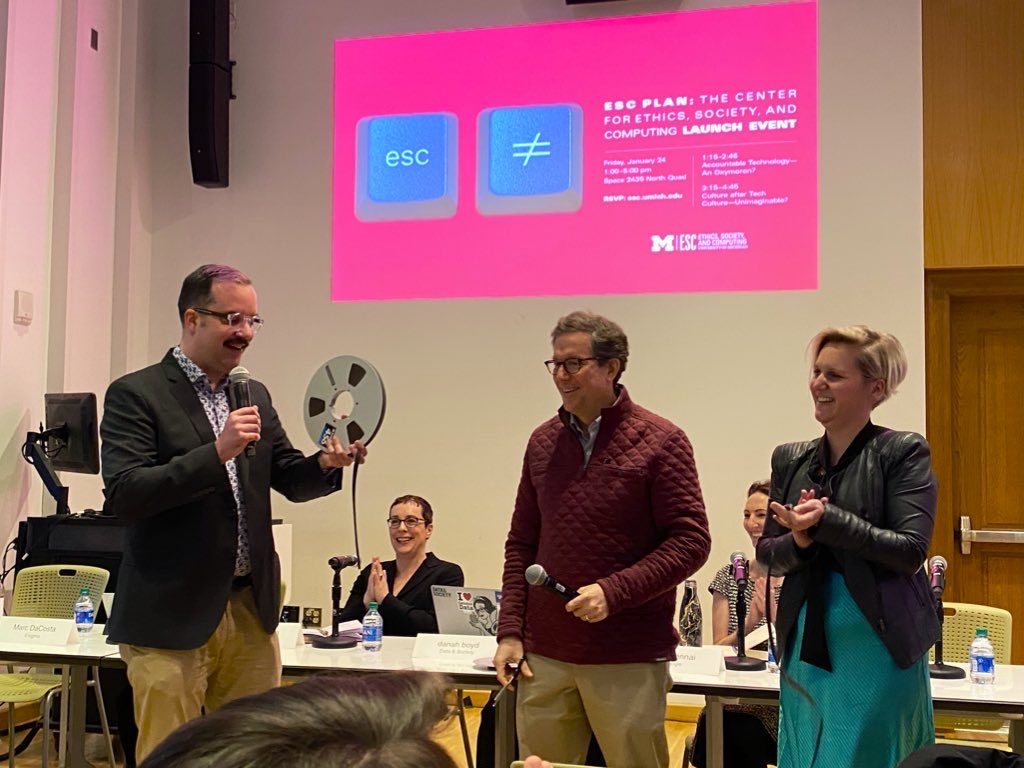ESC Center Tackles Ethical Questions about Tech
Post developed by Katherine Pearson
Christian Sandvig, the Director of the new Center for Ethics, Society, and Computing (ESC), says he developed this new center “to reconcile the fact that I love computers, but I’m horrified by some of the things we do with them.” ESC is dedicated to intervening when digital media and computing technologies reproduce inequality, exclusion, corruption, deception, racism, or sexism. The center was officially launched at an event on January 24, 2020. Video of the event is available here.
The associate director of ESC, Silvia Lindtner, elaborated on ESC’s mission at the event. “I’ve learned over the years not to shy away from talking about things that are uncomfortable,” she said. “This includes talking about things like sexism, racism, and various forms of exploitation – including how this involves us as researchers, and how we’ve experienced these ourselves.”
ESC is sponsored by the University of Michigan School of Information, Center for Political Studies (CPS), and the Department of Communication and Media. CPS Director Ken Kollman called the new center “an exciting, interdisciplinary effort to ask and address challenging questions about technology, power, and inequality.” Thomas Finholt, Dean of the School of Information, said, “if you look at the world around us there are a seemingly unlimited number of examples where individual leaders or contributors would have benefitted dramatically from the themes this center is going to take on.”
The wide range of disciplines represented among the ESC faculty is essential to its mission. “To have people in computer science, engineering, social science, and humanities interacting together on questions about the impacts of technology strikes me as the kind of necessary, but all too rare, collaborative efforts for generating new ideas and insights,” Kollman said.

Christian Sandvig, Thomas Finholt, and Sylvia Lindtner cut the ribbon to launch the ESC Center
The launch event was comprised of two panel discussions featuring notable experts in technology and its applications. The first panel, “Accountable Technology — An Oxymoron?” explored the ways that big companies, the media, and individual consumers of technology hold the tech industry accountable for issues of equity and fairness. Pulitzer Prize-winning journalist Julia Angwin highlighted journalists’ role in investigating and framing coverage of tech, including her work to launch a publication dedicated to the investigation of the technology industry. Jen Gennai, Google executive responsible for ethics, fielded questions from the audience about accountability. danah boyd, Principal Researcher at Microsoft Research and the founder of Data & Society, and Marc DaCosta, co-founder and chairman of Enigma, rounded out the panel, which was moderated by Sandvig.
During the second panel, “Culture After Tech Culture — Unimaginable?” Silvia Lindtner, Holly Okonkwo, Michaelanne Dye, Monroe Price, Shobita Parthasarathy, and André Brock debated the inevitability of technology’s impact on culture, and how the future might be reimagined. The panelists challenged the audience to think of technology from the perspectives of different cultures around the world, not just a single monolithic entity. Questions from the audience interrogated the ways the tech could be more inclusive.
ESC organizers encourage students and faculty to get involved with the new center. A series of mixers to get to know ESC are scheduled through the spring.

